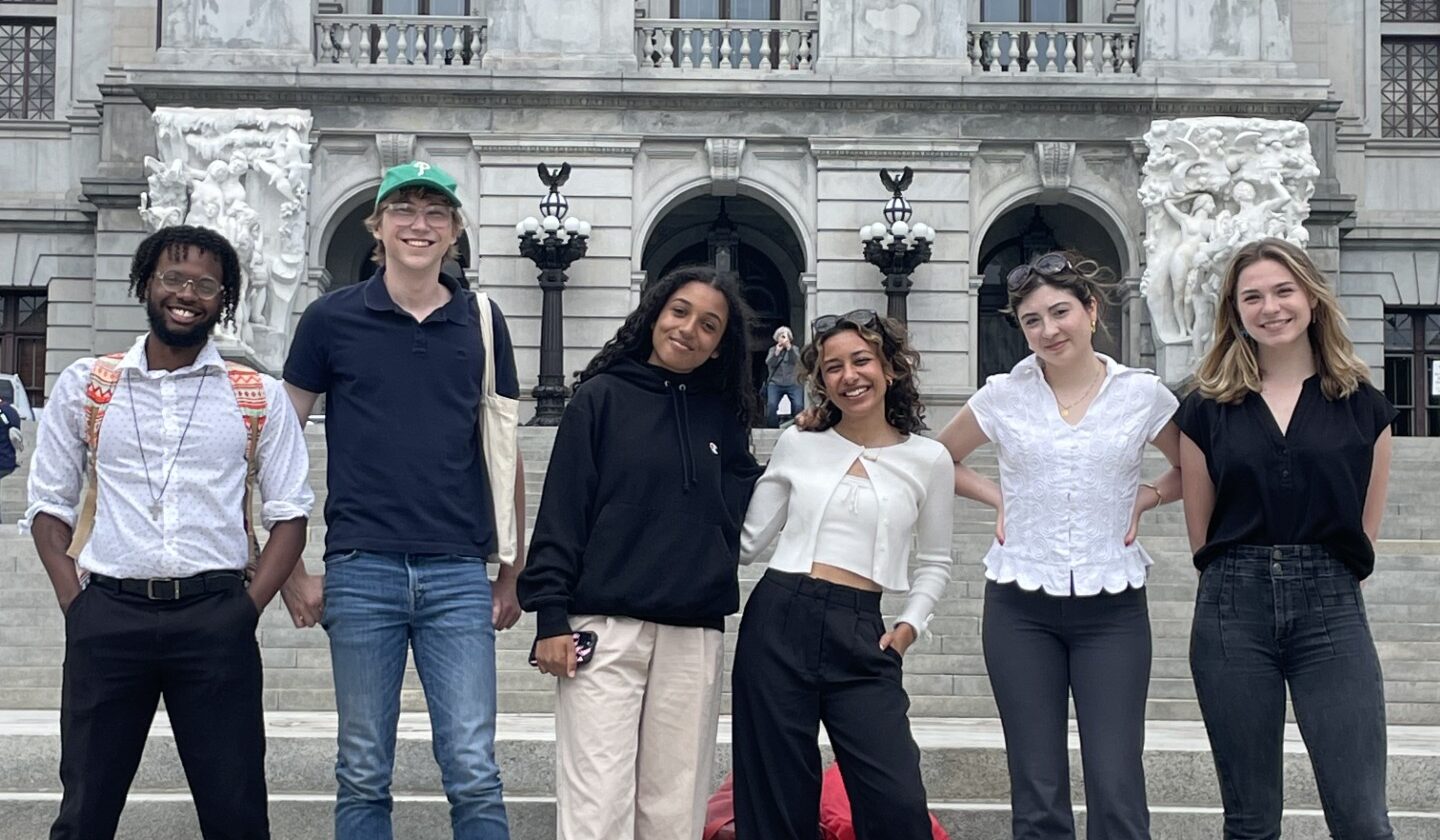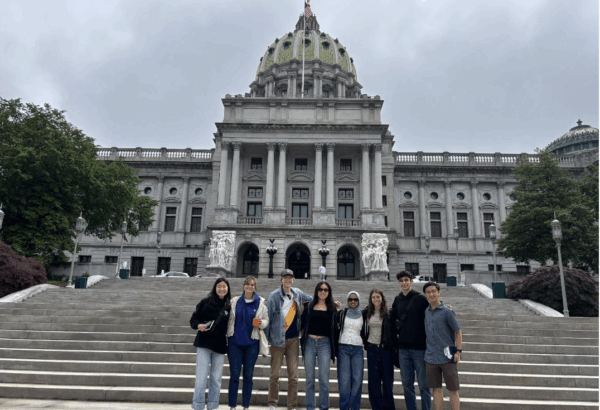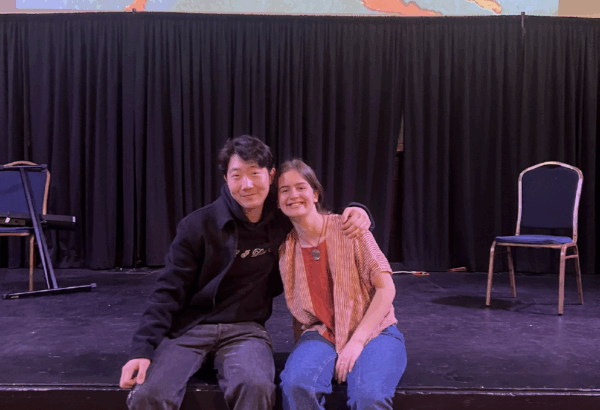Political Empathy Lab (PEL) Borrows the Netter Center for Community Partnerships’s Van
I want to start this reflection by thanking Rita Hodges and Yetunde Pinckney at the Netter Center. Not only did you lend Political Empathy lab your van for a tour of Philadelphia you also exposed me to my favorite new term.
You see, to drive a van at Penn you must complete a series of 10 modules as part of a safe driver training. Even though I did not end up being our driver, I did complete the modules just in case and while doing so I learned the term “inattentive blindness.”[1] This is a fascinating concept that basically means that even if you have perfect vision, you fail to see something that is right in front of you because you are distracted by something you are thinking about. In essence because you are not attending to something directly physically in front of you, you cannot see it because something that is not even there has captured your attention.
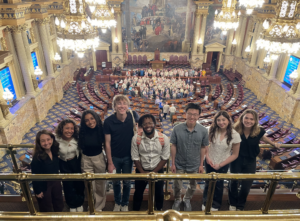
Bearing Witness to State Level Decision Making
To me this describes the feeling I had while in Harrisburg with the PEL team. Sitting in the Gallery of the House of Representatives on the afternoon of June 11 we heard the last 30 minutes or so of voting for the day. While we sat there, at least five pieces of very important legislation came up for a rapid vote. Among the items I quickly tried to capture in my notes:
- Should SNAP recipients have 30 hour a week mandatory work requirements (determined “no” by the one vote majority held by Democrats)
- Should SNAP benefits be curtailed or reduced based on the overspending of six cases of overspending (likewise rejected by the one vote majority held by Democrats)
- Should Immigrants be able to receive SNAP benefits (this I am less sure on the dimensions of but had a party line vote D 101 yays and R 100 nays)
- Lifetime recovery care for substance abuse (unanimously passed)
- Two Agriculture bills (different ones that I would need to read the text of to see the nuances) but the first was unanimously voted upon in the affirmative. The second was more complex “Agriculture Innovation Fund” and was split (162 yays and 39 nays)
All of these pieces of legislation seemed pretty consequential, and many were voted for along party lines thus only being decided by a single members’ vote. These are tenuous decisions upon legislation which have such big impact on the citizens of Pennsylvania, especially those of lower income.
And yet, who is paying attention to these votes? Who even knows that they are going on? What media outlets remain at this moment to report on them with the detail they deserve?
Having spent my career focused on American Politics and frequently teaching about federalism, I understand theoretically this quintessential element of American politics of shared distribution of power between the government in Washington DC, the 50 states and the thousands of local governments. I know that state and local government have control over the many complex rules that govern our daily lives. And even with this knowledge, I am almost exclusively focused on national politics, and “inattentively blind” to Harrisburg. I practice a citizenship that ignores or cannot even see the politics that I actually have the most agency over. Sitting in that gallery with just a few other people who were there to be formally recognized in the beginning of the day’s session and then a smattering of other staff as the day wore on, I was convicted of the power of bearing witness to state government at work. The flip side of that coin is the danger of not watching (and elected representatives knowing you are not watching) as very important decisions are made in plain sight. Anyone who subjects themselves to a metal detector can enter the Capitol building in Harrisburg and watch the proceedings. This was my first time doing so and I am convinced that I need be paying attention a bit more.
I want to take a moment here to say that PEL is deeply fortunate to have the guidance and connections of Penn’s Director of Commonwealth Affairs, Michael F. Smith. Working out of the University’s Office of Community and Government Affairs, Michael represents Penn in Harrisburg. None of what is new to me is new to him and he has been and continues to be a patient teacher. The PEL research team had lunch with him in the Capitol building. While we were asking our questions and sharing about our day we noticed as a steady stream of Members of the Pennsylvania Congress and staffers stopped by our table to greet Michael and meet us. It was very special.
Zoo Animals in the Capitol?
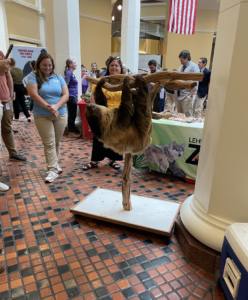
Beyond that vote, while we were in the Capitol building we saw a large group of Boy Scouts of America getting their picture taken in the rotunda entry way area. We also saw a group called Free My Weedman make an appeal against criminalizing marijuana especially the unfair sentencing of Black men and women. At the same time, we saw the Hershey Chocolate company have characters dressed up and walking around. And there were a variety of other tables with information on a variety of policy issues from childcare to climate change.
As we went to the bottom floor, we saw representatives from zoos across the state advocating for state funding. To help them make their case they brought animals, a sloth climbed on a simulated tree, a mini alligator was held by a keeper, a capybara was on a leash, and I counted an uncomfortable number of snakes in aquariums some marked “venomous.”
June is the month where the PA Government works on the budget and different groups come to advocate for funding. June 11 just happened to be the day where zoos and animal advocacy organizations were working to ensure funding support.
We walked outside and saw State Senator Doug Mastriano organized a press conference around service working animals and many organizations had a street fair of sorts with tables and service working dogs from a variety of different organizations (including Penn Vet).
It felt overwhelming, it felt democratic, it felt like I had no idea this all was happening. Again, inattentive blindness to my state.
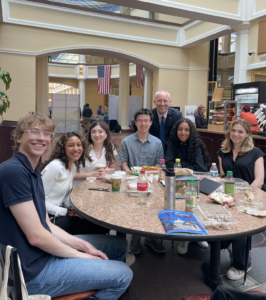
Political Empathy Lab is about connecting with people, and it is also about connecting with place. We talk to people in different places not to extract specific data points about them or persuade them of a defined set of ideas, but to talk with them and see what is important to them and what they think about their place, and we did do that in Harrisburg.
The idea that remains with me, however, is how singularly self-revelatory this trip was. Though all trips have taught me something about myself, this trip revealed my inability to see what is right in front of me. On my reading list is Shoshana Zuboff’s The Age of Surveillance Capitalism: The Fight for A Human Future at the New Frontiers of Power especially for her discussion of the attention economy. Our attention is a valuable resource that entities both commercial and political want to grab. When we are not conscious of it we can be led to distraction and miss what is right in front of us.
I want to start noticing state and local politics and start bearing witness to the governance that influences me and that I might have agency do so something about.
Photos by Dr. Lia Howard.
[1] The term “inattentive blindness”, also known as “inattentional blindness” or “perceptual blindness” is the psychological phenomenon that causes an individual to miss things that are right in front of your eyes.
Simons, Daniel J.; Chabris, Christopher F. (1999). “Gorillas in our midst: sustained inattentional blindness for dynamic events”(PDF). Perception. 28 (9): 1059–1074.

